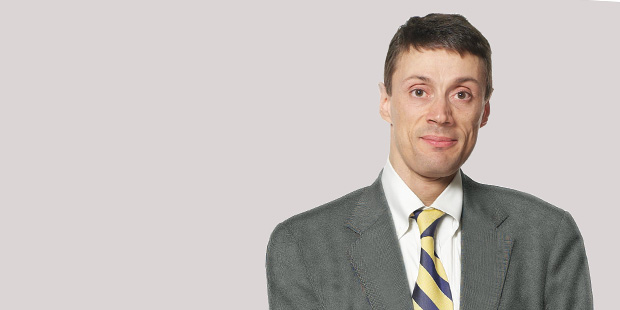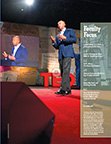Introducing Adam Samaha
Professor of Law
Printer Friendly VersionAdam Samaha’s idea of a wild spring break as a teenager was a weekend at the Iowa caucuses. His bachelor party was a trip to the Herbert Hoover Presidential Library and Museum. His favorite video is a debate among little-known Democratic candidates in Alaska for the U.S. Senate.
“There are some people who watch The Rocky Horror Picture Show over and over, then there’s Adam,” says Lior Strahilevitz of the University of Chicago Law School.
Fueled by his passion for politics, Samaha, 42, who joins NYU Law this fall, is rapidly becoming one of the nation’s leading scholars in constitutional law and theory. “If you’re attending a workshop with Adam, it almost doesn’t matter who the speaker is. His questions are great and he genuinely loves the law,” says Rachel Barkow, Segal Family Professor of Regulatory Law and Policy.
Samaha manages to find fresh perspectives in much-dissected themes of constitutional law. In “Undue Process” (Stanford Law Review, 2006), inspired by attending long condo board meetings, he wonders not whether there is enough due process but why we’re not concerned with too much process. “These are not questions that anyone in constitutional law had ever thought to ask before,” says Daryl Levinson, David Boies Professor of Law.
Samaha’s recent scholarship examines decision-making within legal institutions when people face deep disagreement and uncertainty. In “Randomization in Adjudication” (William and Mary Law Review, 2009), Samaha asks why judges won’t flip a coin to decide the merits of a case, but will accept case assignments via random lotteries. “Some cases that are quite similar are going to come out differently just because one judge is assigned rather than another,” he says.
In a similar vein, “On Law’s Tiebreakers” (University of Chicago Law Review, 2010) explores how legal institutions, which have a unique commitment to avoiding ties, make a decision when one option is not clearly better than another. Samaha concludes that flipping a coin may be best because “it is a cheap and decisive tool that does not waste any relevant information.”
He also weighs in on how regulations are some times adopted to avoid the appearance of wrongdoing. In “Regulation for the Sake of Appearance” (Harvard Law Review, 2012) he develops a framework for evaluating claims that a government decision is justified because it will create a desirable appearance, citing campaign finance regulations as an example. “It turns out that there is some empirical evidence to suggest that an appearance of corruption or non-corruption will influence the reality,” he says, “but with no guarantee that a desirable reality will follow a pleasant appearance in this setting.”
Samaha was raised in suburban Minneapolis by his dad, Joel, a University of Minnesota sociology professor, and his mom, Jennifer, a social worker. Aside from being “a little bit of a rule breaker” in his youth, he had an ordinary childhood except for the onset of a rare neurological disorder. At age 8, he was diagnosed with dystonia, which manifests itself in repetitive movements and abnormal postures, but he did not let the disorder slow him down. He ran cross-country in middle school, played tennis in high school, and had a tight group of friends with whom he took road trips to both the East and West coasts. “He has always been witty and fun, with an appetite for the unconventional and unpredictable,” said long-time pal Minnesota State Representative Steve Simon. Samaha even served up his wedding rehearsal dinner with a double feature at a one-time movie theater turned event hall.
Although there is no cure for dystonia, Samaha refuses drug therapy because a potential side effect is confusion. “I wouldn’t accept that tradeoff—interference with my ability to think about the world in exchange for my ability to physically move through the world.”
Samaha attended Bowdoin College in Maine, where he received a Truman Scholarship and honed his extemporaneous wit as a disc jockey for the college radio station. He spent his junior year in Sweden “to experience a different kind of democracy.” Graduating summa cum laude in 1992 with a double major in history and government, Samaha seemed set on a career in politics.
From 1992 to 1993 he worked as a research assistant at Clinton-Gore National Campaign Headquarters, a writer for the Minnesota House of Representatives, and a speechwriter for the U.S. Department of Energy. But the superficiality of politics left him dissatisfied. Suspecting he’d find law more meaningful, he attended Harvard Law School, where he received the Fay Diploma and the Sears Prize. “He was one of the brightest students I’d taught in a number of years,” recalls Laurence Tribe.
Earning his J.D. in 1996, Samaha clerked for Chief Justice Alexander Keith of the Minnesota Supreme Court, and U.S. Supreme Court Justice John Paul Stevens. He went to work for Robins, Kaplan, Miller & Ciresi in Minneapolis, where he assisted the litigation team in a $6 billion landmark lawsuit against the tobacco industry, but felt a calling to academia.
He started his academic career in 1999 part-time at the University of Minnesota Law School, and like his dad, who twice won distinguished teaching awards, was ranked among the top four professors in overall teaching ability for three consecutive years. In 2007 he won the Graduating Students Award for Teaching Excellence at the University of Chicago Law School, where he started in 2004. “Good teachers offer encouraging words. But great teachers, like Professor Samaha, challenge students to think more carefully, to push beyond settled and comfortable ideas, and to achieve new understandings,” says former student Mitha Rao. “He remains unmatched.”
Samaha is devoted to his research and family. And sometimes, there’s synergy between the two. When considering baby names for their now two-year-old son, he and his artist wife, Abby, fed their favorite names into a computerized randomization program to yield a huge number of three-name permutations. The exercise was merely for inspiration. “Randomization is a sensible decision tool in some situations. But I won’t flip a coin to decide whether Oscar needs a diaper change.”
—

